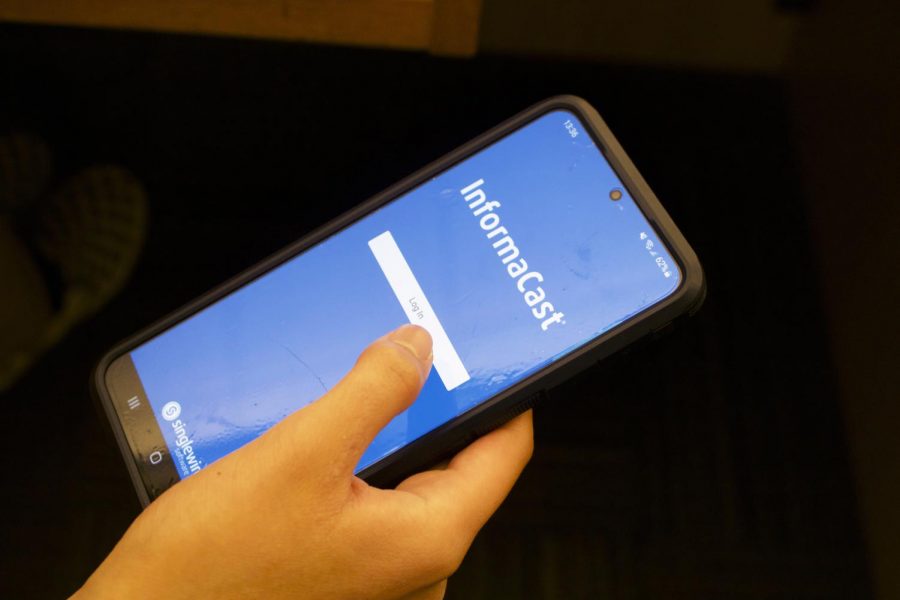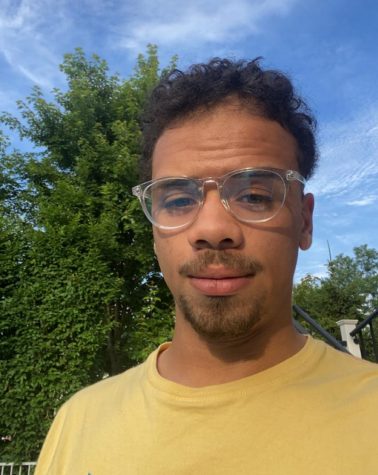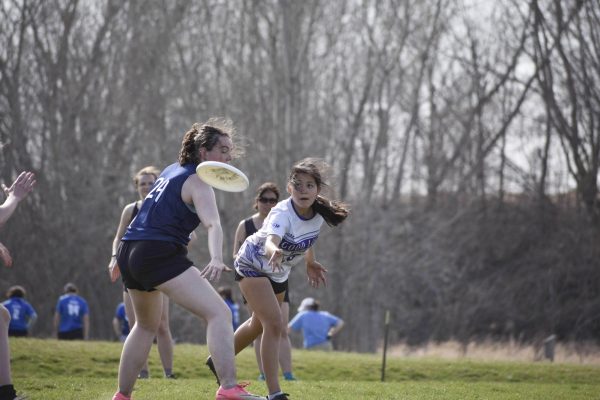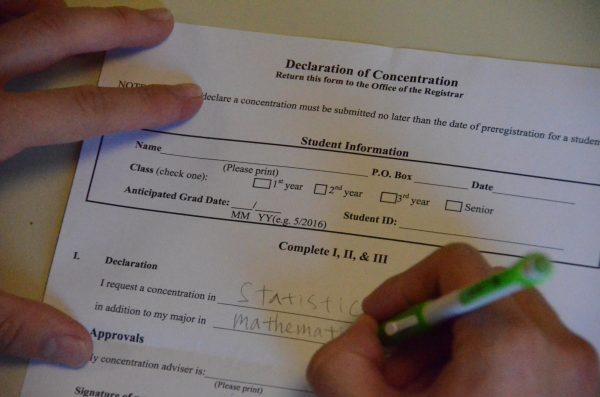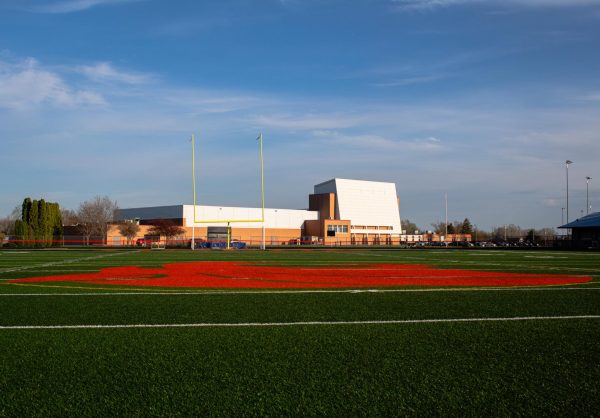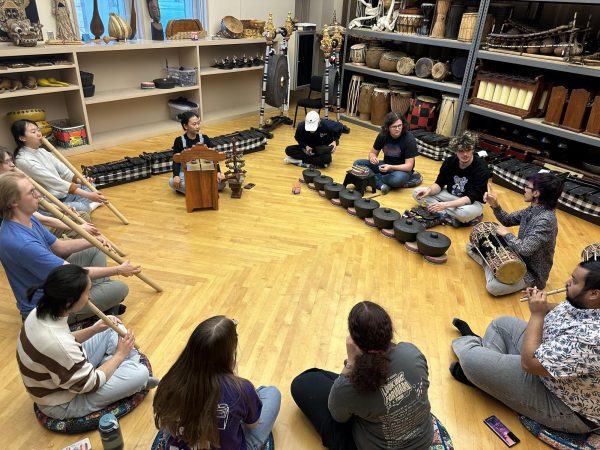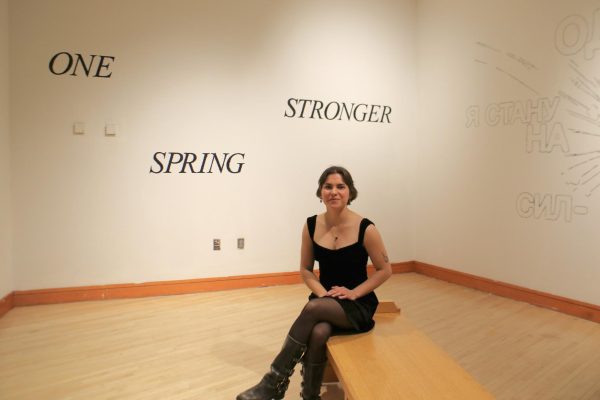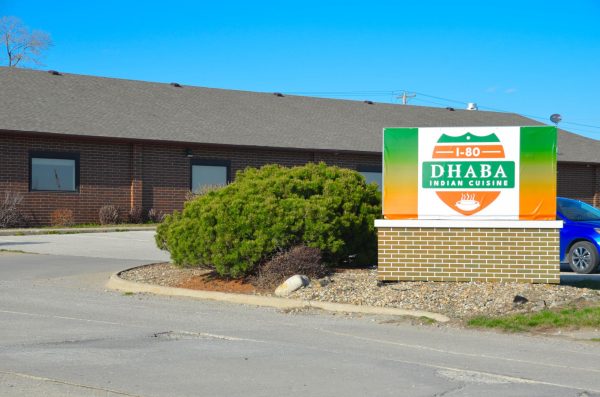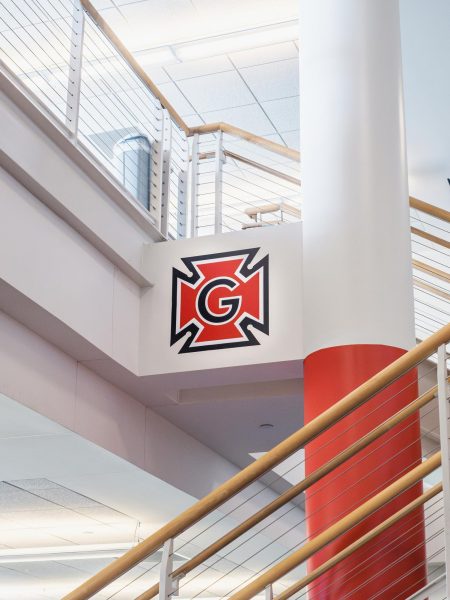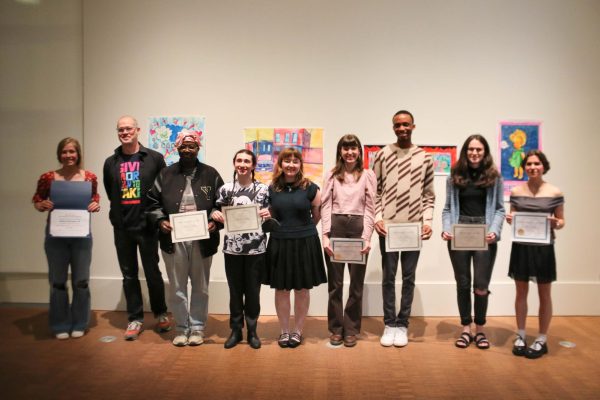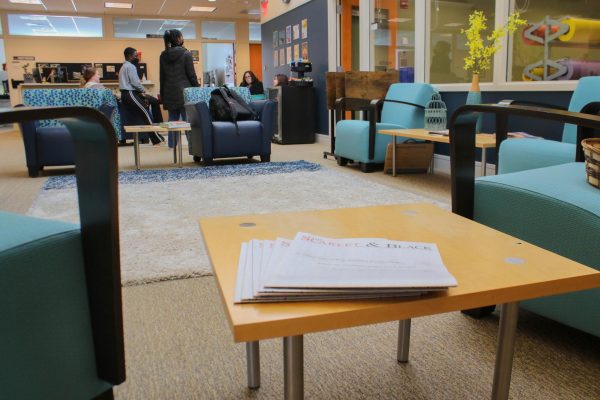New campus safety measures fall short of addressing BSU demands
Photo illustrating a student using the InformaCast app, which features a Campus Alert button.
February 20, 2023
Following incidents of racist harassment and vandalism during the fall 2022 semester, Grinnell College is introducing new safety measures to better protect students on campus. Of the 10 demands the Black Student Union (BSU) put forth in October 2022, only three would be met by the current safety proposals.
In a January email sent to all students titled, “Community and Security at the Beginning of 2023,” Grinnell College President Anne Harris announced the safety and security measures that the College would be pursuing. Exact dates for when these measures will be implemented are unclear.
The S&B has compared the proposed safety measures put forth by campus administration to the BSU demands. The S&B will continue to report on these issues as new developments arise.
Cameras
The installation of cameras with amnesty was one of the demands made by the BSU in October 2022. The cameras have arrived, and they will be installed on campus in the coming weeks, according to Harris’ email, but specifics are unknown.
According to an email from Harris sent in October, the Division of Student Affairs and the Student Government Association are working “to put an amnesty policy in place for immediate implementation when cameras are installed.”
While the camera amnesty policy has not been released yet, Kenn Anderson `24, BSU events coordinator, said that the cameras should only be used to provide evidence of racist incidents, not to surveil students.
“If the cameras are gonna be there for us to actually have some valid proof … of stuff that we face on this campus, then I fully support it.” said Anderson. “But, if the cameras will be there just to monitor us and surveil everything we do, I don’t think they should be a thing. So, it really just depends on the intention.”
Personal Safety Trainings
The personal safety training classes open to students in February were planned in direct response to the BSU demands, according to Heather Cox. The classes are being taught by alumna Anne Stein `84 and Otis Velma of Zendou Martial Arts, based out of Illinois.
Sessions will be held during the evenings of Monday, Feb. 20 through Thursday, Feb. 23 in the Charles Benson Bear `39 Recreation and Athletic Center multipurpose dance studio. The sessions are open to students, but anyone can attend and observe.
Two ALICE active threat sessions were held on Feb. 16 in HSSC S1325, and a third session will be held on Monday, Feb. 27 at 5 p.m. in the Humanities and Social Studies Center room S1325. Future session dates will be announced in the campus memo, according to Heather Cox, director of emergency management and risk mitigation.
ALICE stands for “Alert, Lockdown, Inform, Counter and Evacuate — the components of a proactive, options-based strategy for active threat response,” per Grinnell College Emergency Management in an email sent in February. Sergeant Benjamin Smith, a member of the Grinnell Police Department, was the instructor for the sessions.
“The ALICE trainings are not in response to the racist incidents on campus or the BSU demands, but rather the culmination of a long-term effort to provide active threat training, which was fast-tracked by the recent false ‘active intruder’ alarm in the HSSC,” Cox said in an email to the S&B, referencing the alarm that was triggered in November 2022.
Lighting
The campus lighting committee has ordered new light poles for Park Street which will arrive in spring 2024, according to Harris. Additional lighting needs are under review.
Three temporary light poles were installed at the intersection of Park and 10th St., East and 8th St. and in the parking lot across from Main Hall following the racist vandalism in 2022, where they are still located.
“While we did say it’s dark around here, we did not mean one big light at the corner,” said Anderson. “We meant the campus. The campus is still pretty dark. We don’t get light until we get down there at the dorm, you know? The lights are performative,” said Anderson.
InformaCast App
In an email sent on Nov. 17, 2022, Grinnell College Emergency Management announced the availability of InformaCast, a mobile app that features a campus alert button. When the button is pressed, Campus Safety can view a user’s location and attempt to call or text you to gather more information. The user can then choose one of three follow-up responses — a need for medical assistance, feeling unsafe and needing help or to report harassment or vandalism occurring. If the button is pressed off campus or out of town, Campus Safety will attempt to contact the user, and if there is no response, will notify the authorities near their location.
“The alert button can immediately notify a Campus Safety dispatcher of the need for assistance or other issues of concern. The alert button does not replace or supplement 911 and will not notify the police when activated,” Harris wrote in the email sent on Jan. 23, 2023.
Mental Health Resources
Mental health resources at the College specific to minority students are not yet available in-person or on campus.
“SHAW and ODEI continue to seek out mental health resources tailored to the needs with minoritized identities,” Harris wrote. “The ideas generated by this workshop [Nov. 29 community dialogue] are being compiled, and next steps will be communicated in the spring [of 2023].”
BSU Demands Unanswered
In Oct. 2022, the BSU released 10 demands to Grinnell College. Seven of these demands — legal accountability for hate crimes, required recovery days, paid time off for Black student workers, required emergency town hall meetings with Grinnell residents after incidents of racist harassment or abuse, mentorship resources and a Know Your Rights training camp — have not been addressed by the College.
“I won’t speak for the whole BSU, but I feel as if we are being heard, but nothing is being done about it,” Anderson said. “I just think they have this very big lack of urgency, and that bothers me because I’m Black, and it’s scary to walk back to my dorm from the JRC, and that’s the problem.”
Maure Smith-Benanti, assistant vice president of student affairs and dean of inclusive initiatives, did not respond to a request for comment. Ashley Adams, associate director of student involvement, redirected The S&B to Ellen de Graffenreid, vice president of communications and marketing, who then referred the newspaper to Cox.




























































